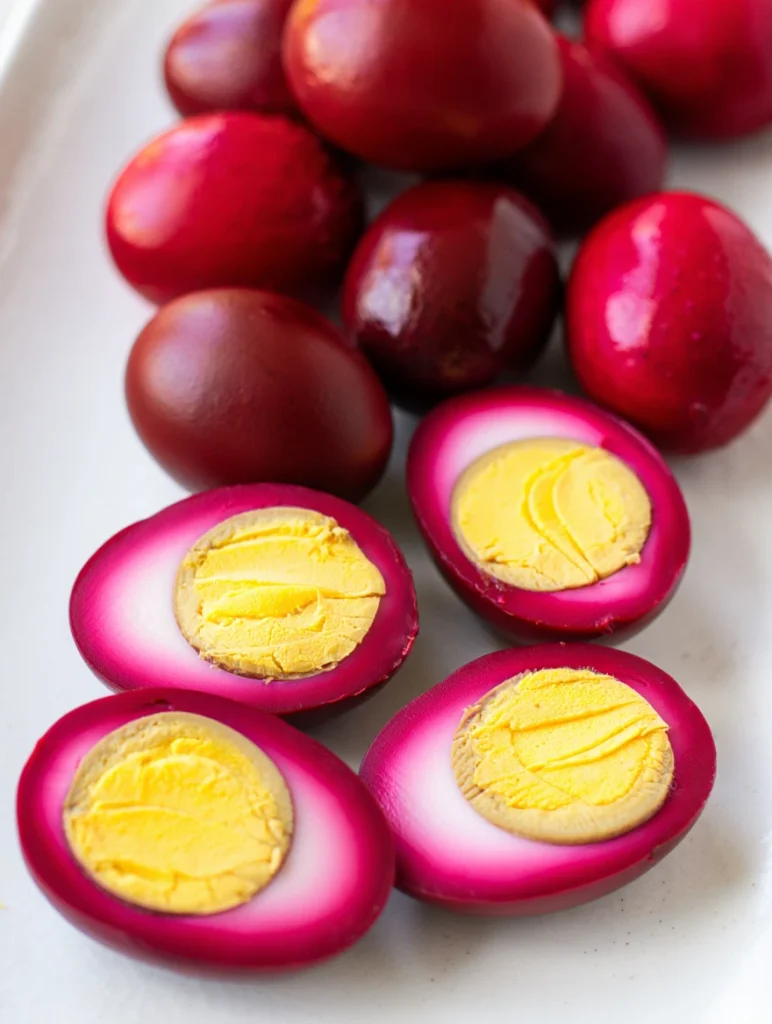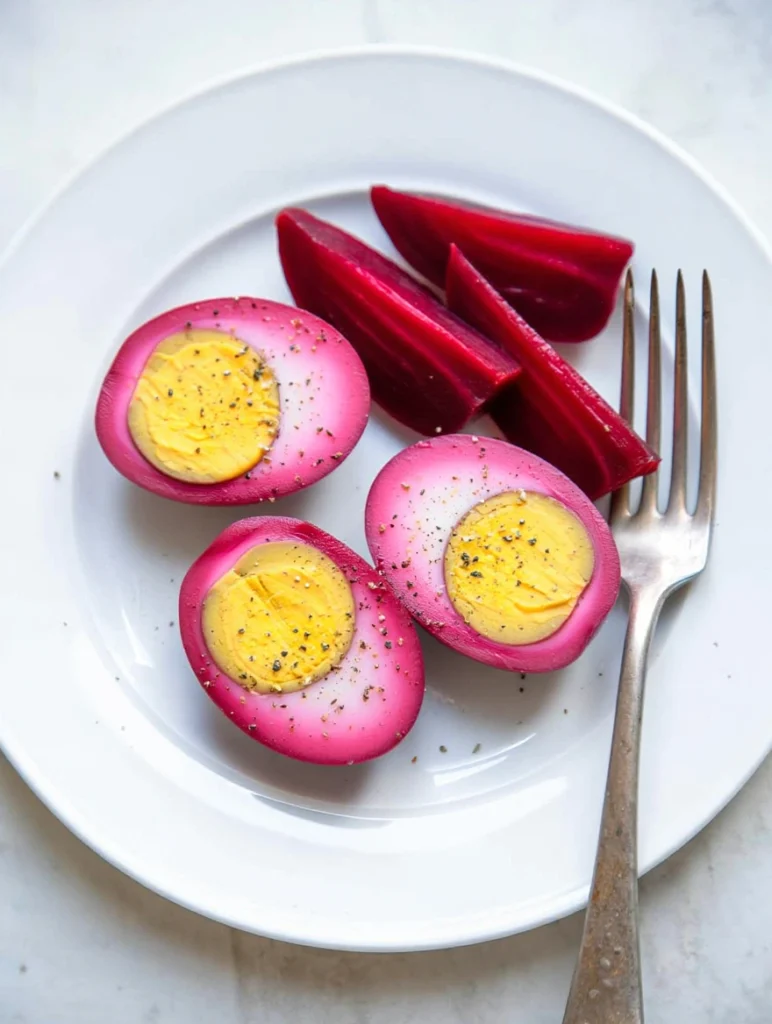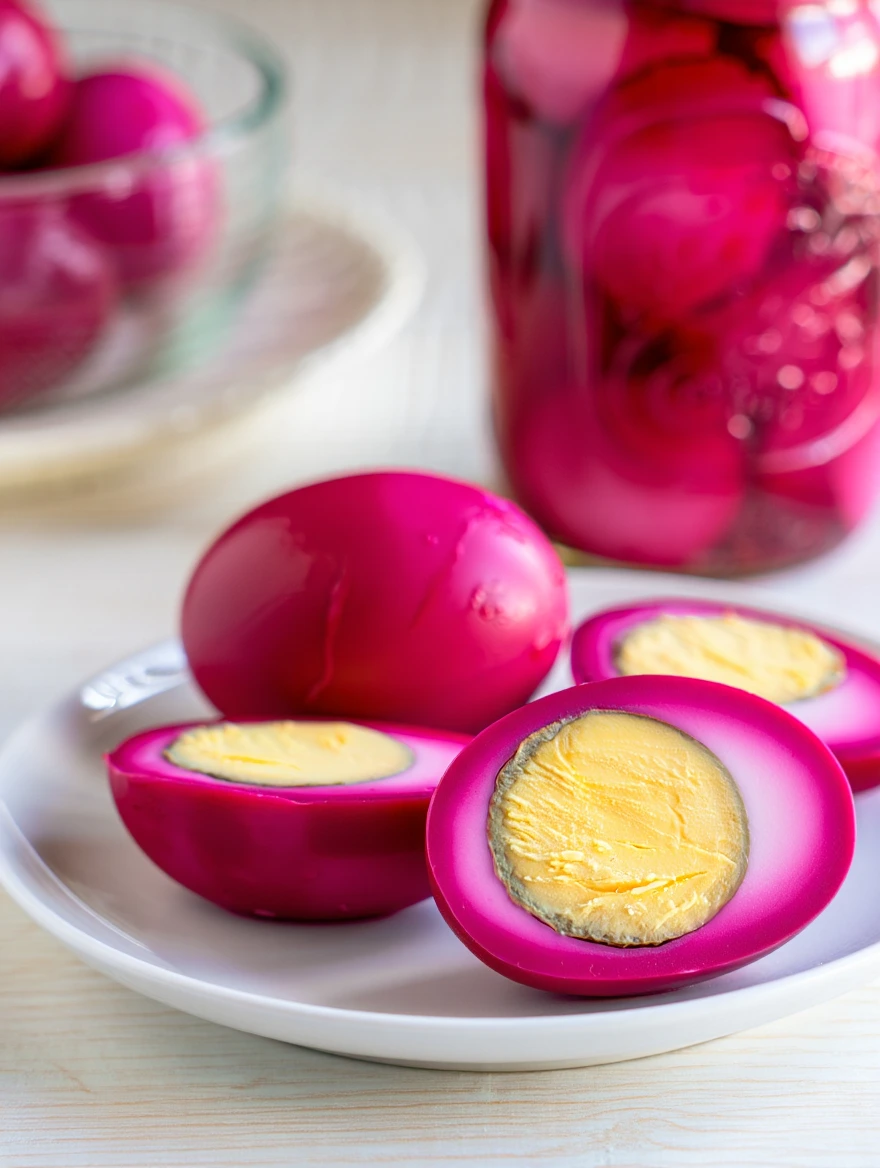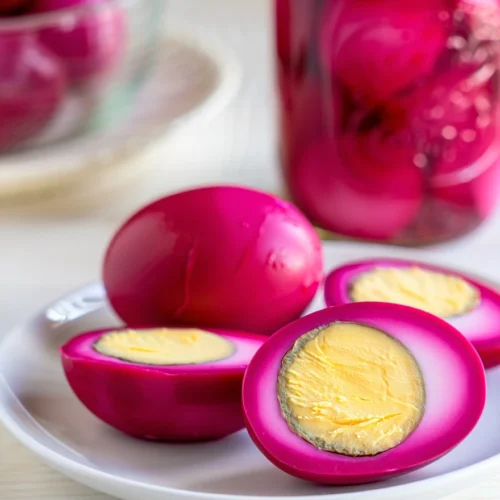Pickled eggs are one of those simple yet impressive foods that transform ordinary hard-boiled eggs into something special. These tangy, flavorful gems take on beautiful colors and absorbing the delicious flavors of vinegar, spices, and herbs. I’ve been making pickled eggs for family gatherings for years, and they always disappear quickly. The best part is how versatile they are – you can adjust the seasonings to make them mild or spicy, sweet or savory. Perfect as a protein-rich snack, appetizer, or salad topping, pickled eggs are both practical and delicious. This recipe creates beautifully pink pickled eggs with a balanced flavor that’s tangy but not overwhelming.
Table of Contents
Reasons to Try Pickled Eggs
Pickled eggs are worth making for so many reasons. First, they’re incredibly easy to prepare with simple ingredients you likely already have. The pickling process transforms ordinary eggs into something special with complex flavor. They’re also a great protein source that keeps well in the refrigerator for weeks, making them perfect for meal prep. The beautiful pink or purple color adds visual appeal to any plate or charcuterie board. Pickled eggs are also highly customizable – you can make them spicy, sweet, or herbal depending on your taste preferences. Plus, they’re a great way to use up extra eggs if you keep chickens or bought too many before a holiday.
Where did Pickled Eggs come from?
Pickled eggs have a rich history dating back centuries. They became popular in England during the 17th and 18th centuries when preservation methods were essential for extending food shelf life. Pub owners would keep large jars of pickled eggs on the counter as free snacks that made patrons thirsty (and likely to order more drinks). German and Pennsylvania Dutch communities brought the tradition to America, where pickled eggs became a common sight in country stores and bars. The recipe evolved differently across regions, with some areas favoring sweet pickling brines while others preferred spicier versions. Today, pickled eggs remain popular in many cultures as both a practical preservation method and a delicious snack.

Ingredients Notes
- Eggs: Use fresh eggs that are at least a week old for easier peeling. Farm-fresh eggs, while delicious, can be challenging to peel when hard-boiled. Choose large or extra-large eggs for the best results.
- White vinegar: Provides the acidic base for pickling. You can substitute apple cider vinegar for a different flavor profile.
- Beets: Fresh or canned beets create the vibrant pink color and add sweetness. If using fresh, choose firm beets without soft spots.
- Onions: Yellow or white onions work best. Red onions can make the brine murky.
- Sugar: Regular granulated sugar balances the acidity. You can adjust the amount based on preference.
- Salt: Use kosher or pickling salt without additives for best results.
- Spices: Whole spices like peppercorns, mustard seeds, and bay leaves release flavor slowly for a more complex taste.
How to Make Pickled Eggs
Step 1
Place 12 eggs in a large pot and cover with cold water by 1 inch. Bring to a boil over medium-high heat.
Step 2
Once boiling, remove the pot from heat, cover, and let sit for exactly 12 minutes for perfectly cooked hard-boiled eggs.
Step 3
Transfer eggs to an ice bath immediately to stop the cooking process and cool for 15 minutes.
Step 4
Carefully peel the eggs under running water, which helps remove the shells more easily.
Step 5
In a medium saucepan, combine 2 cups white vinegar, 1 cup water, 1/2 cup sugar, 2 tablespoons salt, 1 sliced onion, 1 cup sliced beets (with juice if using canned), 1 tablespoon mustard seeds, 1 teaspoon black peppercorns, 2 bay leaves, and 3 cloves of crushed garlic.
Step 6
Bring the pickling mixture to a boil, then reduce heat and simmer for 5 minutes to blend the flavors.
Step 7
Allow the brine to cool slightly for about 10 minutes.
Step 8
Place peeled eggs in clean glass jars with tight-fitting lids. Pour the warm (not hot) brine over the eggs, making sure they’re completely covered.
Step 9
Seal the jars and refrigerate for at least 24 hours before eating, though 5-15 days produces the best flavor and color.
What You Must Know About Pickled Eggs
Safety is crucial when making pickled eggs. Unlike canned vegetables, pickled eggs cannot be safely processed for shelf stability and must be stored in the refrigerator. Never leave pickled eggs at room temperature for more than 2 hours. The pickling solution must contain sufficient acid (vinegar) to prevent bacterial growth. For the same reason, always use clean utensils when removing eggs from the jar to prevent contamination. Eggs need at least 24 hours to begin taking on flavor, but patience pays off – the longer they sit (within reason), the more flavorful they become.
Helpful Tips
When peeling hard-boiled eggs, start at the wider end where there’s usually an air pocket, which makes starting the peeling process easier. Adding a teaspoon of baking soda to the boiling water can help make eggs easier to peel. For more vibrant color, leave a few slices of beet in the jar with the eggs. If you find your eggs are floating in the jar, place a clean small weight (like a shot glass) on top to keep them submerged in the brine. For consistent flavor, turn the jar gently each day to ensure the brine circulates.
Variations and Substitutions
- Spicy Pickled Eggs: Add 1-2 sliced jalapeños or 1/2 teaspoon red pepper flakes to the brine.
- Herb-Infused: Add fresh dill, tarragon, or thyme sprigs to the jar.
- Curry Pickled Eggs: Add 1 tablespoon curry powder and 1 teaspoon turmeric to the brine for golden pickled eggs.
- Sweet and Sour: Increase sugar to 3/4 cup for a sweeter profile.
- Garlic Lovers: Double or triple the garlic amount for a stronger garlic flavor.
- Vinegar Variations: Substitute apple cider vinegar or rice vinegar for part of the white vinegar.
- No Beets: If you don’t like beets, omit them and add 1 teaspoon turmeric for yellow eggs or a few drops of food coloring.

Serving Suggestions for Pickled Eggs
Serve pickled eggs as part of an appetizer platter with cheese, crackers, and vegetables. Slice or quarter them to top green salads for a protein boost with tangy flavor. Chop pickled eggs for egg salad sandwiches with a twist – the pickling flavors reduce the need for additional mayonnaise. Use as a colorful and flavorful garnish for cold soups like borscht or cucumber soup. For a simple standalone snack, sprinkle with fresh herbs and a bit of coarse salt. They also make excellent additions to grain bowls or alongside cold cuts for a quick lunch.
Storage
Store pickled eggs in their brine in airtight glass containers in the refrigerator. Properly stored, they will maintain good quality for 3-4 weeks. Never store at room temperature. Use clean utensils each time you remove eggs from the jar to prevent contamination. The eggs are best consumed within the first 2-3 weeks when flavors and texture are optimal. The pickling liquid can be reused for one additional batch of eggs if refrigerated, though the flavor intensity will decrease.
Nutrition Facts (Per Serving)
- Calories: 85
- Protein: 6g
- Carbohydrates: 4g
- Fat: 5g
- Sodium: 380mg
- Sugar: 3g
- Cholesterol: 185mg
- Fiber: 0g
These nutrition facts are approximate and based on one pickled egg without added condiments. Values may vary based on specific ingredients used and exact serving size.
Frequently Asked Questions about Pickled Eggs
How long do pickled eggs need to sit before eating?
While you can eat pickled eggs after 24 hours, they reach optimal flavor after 3-5 days in the refrigerator. The longer they sit (up to about 2 weeks), the more the flavors penetrate the eggs.
Can I reuse the pickling brine?
Yes, you can reuse the brine once for a second batch of eggs, but discard it after that. The reused brine will produce a milder flavor and less vibrant color than the first batch.
Why did my eggs turn rubbery?
Eggs can become rubbery if they’re stored in the brine for too long (more than 3-4 weeks). For the best texture, consume pickled eggs within 2-3 weeks of making them.
Do I need to use beets in pickled eggs?
No, beets are optional and mainly add color and some sweetness. You can make pickled eggs without beets and still get great flavor, though they won’t have the distinctive pink color.
Can pickled eggs be left out at room temperature?
No, pickled eggs must be refrigerated at all times except when serving. Never leave them at room temperature for more than 2 hours, as they can develop harmful bacteria.
Why are my pickled eggs tough?
Overcooked eggs often become tough. Make sure to follow the 12-minute cooking time and use an ice bath immediately after cooking to prevent the eggs from overcooking.
You may also like:
Creamy Scrambled Eggs with Cottage Cheese Recipe
Irresistible Pickled Eggs Recipe
Ingredients
- 12 large eggs
- 2 cups white vinegar
- 1 cup water
- 1/2 cup granulated sugar
- 2 tablespoons kosher salt
- 1 medium onion sliced
- 1 cup sliced beets fresh or canned with juice
- 1 tablespoon mustard seeds
- 1 teaspoon black peppercorns
- 2 bay leaves
- 3 cloves garlic crushed
Instructions
- Hard-boil eggs by placing them in cold water, bringing to a boil, then removing from heat and letting stand covered for 12 minutes.
- Transfer eggs to an ice bath and cool for 15 minutes before peeling carefully.
- Prepare pickling solution by combining vinegar, water, sugar, salt, onion, beets, mustard seeds, peppercorns, bay leaves, and garlic in a saucepan.
- Bring pickling solution to a boil, then reduce heat and simmer for 5 minutes.
- Allow brine to cool slightly for 10 minutes.
- Place peeled eggs in clean glass jars.
- Pour warm brine over eggs, ensuring they’re completely covered.
- Seal jars and refrigerate for at least 24 hours before eating (3-5 days for best results).
- Store in refrigerator for up to 3-4 weeks.
Leave a Reply
Recipe Ratings
There are no reviews yet. Be the first one to write one.

